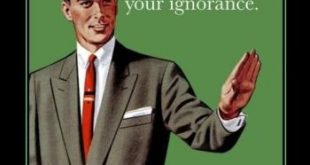Reading an applied econometrics paper could leave you with the impression that the economist (or any social science researcher) first formulated a theory, then built an empirical test based on the theory, then tested the theory. But in my experience what generally happens is more like the opposite: with some loose ideas in mind, the econometrician runs a lot of different regressions until they get something that looks plausible, then tries to fit it into a theory (existing or...
Read More »The Economist — economics prone to fads and methodological crazes
The Economist — economics prone to fads and methodological crazes When a hot new tool arrives on the scene, it should extend the frontiers of economics and pull previously unanswerable questions within reach. What might seem faddish could in fact be economists piling in to help shed light on the discipline’s darkest corners. Some economists, however, argue that new methods also bring new dangers; rather than pushing economics forward, crazes can lead it...
Read More »Om ekonomiskt vetande — Fronesis nr 54-55
Om ekonomiskt vetande — Fronesis nr 54-55 Efter den globala finanskrisen 2008 har den ekonomiska vetenskapen hamnat i blickfånget. Studentrörelser och heterodoxa ekonomer har kritiserat det dominerande ekonomiska paradigmet och krävt ökad pluralism. Den senaste tidens politiska utveckling har blottat nyliberalismens brister och aktualiserat frågan om dess koppling till den ekonomiska vetenskapen. I Fronesis nr 54–55 fördjupar vi oss i det ekonomiska...
Read More »The use of mathematics in physics and economics
The use of mathematics in physics and economics My idea is to examine the most well-known works of a selection of the most famous neoclassical economists in the period from 1945 to the present. My survey of well-known works by four famous mathematical neoclassical economists (Samuelson, Arrow, Debreu, Prescott) who all won the Nobel Prize for economics, has not revealed any precise explanations or successful predictions. This supports my conjecture that...
Read More »Why IS-LM doesn’t capture Keynes’ approach to the economy
Why IS-LM doesn’t capture Keynes’ approach to the economy Suppose workers are unemployed. As a result, although willing to work even at lower wages, they are unable to buy consumption goods. As a result, firms are unable to sell those goods if they produced them. So they do not employ the workers who, as a consequence, do not have the wages to buy the consumption goods. The economy is caught in a vicious cycle of deficient demand. According to the IS/LM...
Read More »Endogenous growth theory — a crash course
Endogenous growth theory — a crash course
Read More »What is ergodicity?
Why are election polls often inaccurate? Why is racism wrong? Why are your assumptions often mistaken? The answers to all these questions and to many others have a lot to do with the non-ergodicity of human ensembles. Many scientists agree that ergodicity is one of the most important concepts in statistics. So, what is it? Suppose you are concerned with determining what the most visited parks in a city are. One idea is to take a momentary snapshot: to see how many people are...
Read More »Mainstream economics — sacrificing realism at the altar of mathematical purity
Mainstream economics — sacrificing realism at the altar of mathematical purity Economists are too detached from the real world and have failed to learn from the financial crisis, insisting on using mathematical models which do not reflect reality, according to the Bank of England’s chief economist Andy Haldane. The public has lost faith in economists since the credit crunch, he said, but the profession has failed to thoroughly re-examine its failings to...
Read More »The rebel who blew up macroeconomics
The rebel who blew up macroeconomics Paul Romer says he really hadn’t planned to trash macroeconomics as a math-obsessed pseudoscience. Or infuriate countless colleagues. It just sort of happened … The upshot was “The Trouble With Macroeconomics,” a scathing critique that landed among Romer’s peers like a grenade. In a time of febrile politics, with anti-establishment revolts breaking out everywhere, faith in economists was already ebbing: They got blamed...
Read More »‘Post-real’ macroeconomics — three decades of intellectual regress
‘Post-real’ macroeconomics — three decades of intellectual regress Macroeconomists got comfortable with the idea that fluctuations in macroeconomic aggregates are caused by imaginary shocks, instead of actions that people take, after Kydland and Prescott (1982) launched the real business cycle (RBC) model … In response to the observation that the shocks are imaginary, a standard defence invokes Milton Friedman’s (1953) methodological assertion from unnamed...
Read More » Heterodox
Heterodox










